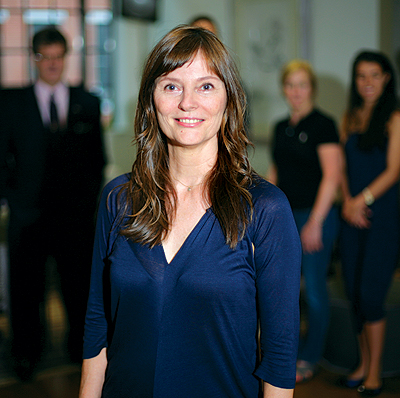
Vickey Barron at her 38 Bethune Street listing during a recent tour of West Village townhousesOn a warm Saturday last month, apartment-seekers who followed signs for an open house at 915 President Street in Park Slope were surprised to find not one, but two units for sale in the building.
The listing agents, Prudential Douglas Elliman’s Immacolata Giocoli and Joseph Baglio of the Brooklyn firm Madison Estates, had teamed up to market the two airy studios on the first floor of the prewar co-op, which are each priced at around $250,000. They directed visitors to each other’s listings, and pointed out that the apartments can be combined.
At first, it may seem counterintuitive for rival brokers — who are, after all, competing for the same pool of buyers — to work together in this way. But Baglio said he views the co-open house as “double-exposure” for his listings.
“We are definitely making more deals this way,” he added.
This kind of teamwork is called “caravanning,” according to MLB Kaye International Realty associate broker Fern Kamins, and it’s been making a comeback. The idea behind caravanning is that brokers from different firms join forces to market their inventory to clients looking for similar properties in the same neighborhoods. It ranges from casual situations, like double open houses, to organized tours featuring up to seven or eight properties in the same area. The tours often feature lunch or dinner options, and even themes: Brokers said one 2010 open house tour even required participants to dress up for Halloween.
Caravanning, big in the 1980s and 1990s as a result of huge co-op inventory, went out of fashion during the housing bubble of the mid-2000s, when brokers didn’t need much help selling properties. Some even kept their listings as private as possible, hoping for a direct sale, brokers said.
Since the downturn, however, the practice has been revived, with brokers increasingly warming up to co-brokering in hopes of getting the most exposure possible for their listings. It can also serve as a helpful strategy for properties that have been hanging around on the market for a while — as many in today’s market have.
“It’s cyclical,” said Kamins, who often opts to include her listings in caravan tours. “It goes with the market. When the market is bad, everybody wants everybody else to see their listings.”
Vickey Barron, a managing director at the brokerage Core, said she regularly organizes tours by seeking out apartments similar to her own listings, then reaching out to other brokers to get their cooperation. Her recent projects have included tours of West Village townhouses and two-bedroom prewar apartments in Carnegie Hill.
The practice “should have never died,” said Barron, who added that she sees many more sales through caravanning than through traditional open houses.
Convenience for brokers is another advantage of caravanning. Diane Saatchi, a senior vice president at Hamptons brokerage Saunders and Associates, said she organized a 36-property tour of modern Hamptons houses last month to help brokers familiarize themselves with the many homes on the market. “Ever since everything went online, the region that we work in seems to have grown,” Saatchi said. “In the old days, we would just cover East Hampton; now you need to be aware of what’s on the market more generally.”
Dan Tubb, director of sales at Corcoran Sunshine Marketing Group, organizes open-house tours a few times a year. One recent tour involved Battery Park City properties, such as Riverhouse at Two River Terrace and One Rector Park at 333 Rector Street. “I think the game in the last five years has definitely been to embrace the brokerage community across the board,” Tubb observed. “It does not improve sales to hold anything back.”
Sellers are also pushing for more openness about inventory in the market, Kamins said, putting pressure on their brokers to get the most possible exposure for their property. With so few buyers out there, she observed, sellers get extremely anxious. If the property doesn’t sell, she said, “who are they going to blame but the brokers?”